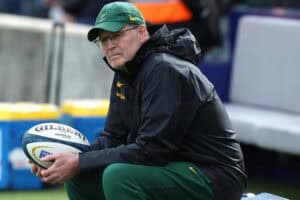How SA's sporting landscape, from the Rugby World Cup to traditional games like morabaraba, fosters unity and shapes the nation's heritage.

As South Africans rally to cheer the Springboks during the 2023 Rugby World Cup, the atmosphere is charged with hope and nostalgia as we recall how sport has contributed to building our nation’s common heritage.
Every sporting event we participate in is a representation of our national heritage – from the singing of our national anthem before the match to the raising of the South African flag and our commendable sportsmanship – our cultural diversity and unity is on display.
Sport allows us to transcend our cultural, racial and linguistic differences. It gives us a sense of belonging and is the common unifier when we join together to support our nation.
It fosters social cohesion, peace and development and contributes to creating our vibrant national heritage.
Our national and living heritage is transmitted through our sports and cultural activities as well as our people, who comprise various ethnicities, cultures and traditions.
This makes South Africa one of the most culturally diverse nations in the world.
Today, we celebrate our diversity and recognise how sport has contributed to uniting a nation that was once divided by its differences.
The potential of sport as an instrument of change was identified by our first democratic president, Nelson Mandela.
In a nation that was bitterly divided by apartheid, Mandela used the 1995 Rugby World Cup to foster a shared national pride and identity.
Madiba has said: “Sport has the power to change the world. It has the power to inspire. It has the power to unite people in a way that little else does. Sport can awaken hope where there was previously only despair. It is more powerful than governments in breaking down racial barriers.”
South Africans put aside their differences and united to celebrate South Africa as “one team” and “one country” when the Springboks won the Rugby World Cup in 1995 over archrivals New Zealand, and euphoria swept across the nation.
This match stands out as a symbolic moment in our nation’s heritage as it leapfrogged reconciliation and boosted our new democracy, which only began a year earlier with our first democratic elections.
Through our democracy, rugby repositioned itself as a sport to help heal and unite our nation, as black South Africans became part of a sport which was once only reserved for whites.
In 2019, we proved unity is strength when the Springboks brought home the Webb Ellis Cup after winning that year’s edition of the Rugby World Cup, led by the team’s first black captain, Siya Kolisi.
Another proud moment in our sporting heritage was when South Africa became the first African country to host the 2010 Fifa World Cup, shining the light on our “Africanness” and the African diaspora.
This provided the platform to present our proudly South African heritage and the spirit of Ubuntu, which inspires nations to adopt a culture of humanity and collectivism.
This year, the spotlight also shone on our Spar Proteas netball team and the Banyana Banyana soccer team.
The active participation of black South African women in global sport indicates the transformation within our heritage.
Our sporting milestones spark hope, especially in historically disadvantaged communities, to work towards developing their lives and our national heritage.
The department of sport, arts and culture offers internship opportunities and bursary programmes to youth who are financially challenged to pursue heritage-related programmes.
We can sustain our heritage by participating in sporting activities and indigenous games such as diketo and morabaraba.
The latter is a traditional board game derived from the Sesotho language, meaning to mill or go around in a circle.
It is also played as a competitive sport in South Africa. Participating in sport provides recreational activities for our youth, which keeps them away from social ills and helps to build healthier communities that uphold our heritage.
Let us therefore keep our national heritage alive by supporting our sports teams and participating in sporting or cultural activities that continue to unite and transform our nation.
Support Local Journalism
Add The Citizen as a Preferred Source on Google and follow us on Google News to see more of our trusted reporting in Google News and Top Stories.






